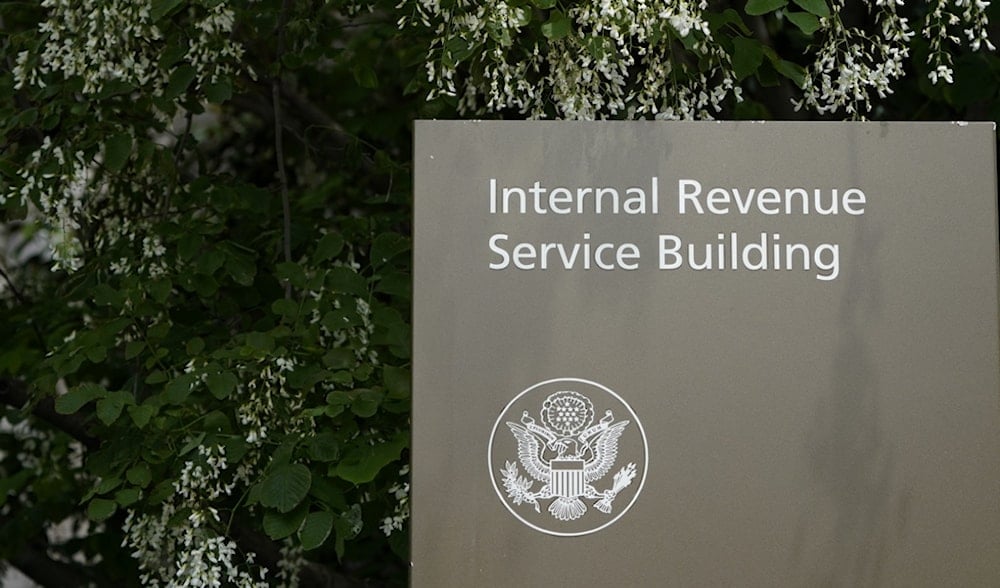IRS nearing deal to share tax data for immigration enforcement: WashPo
The IRS would reportedly cross-check the names of undocumented immigrants with its confidential taxpayer databases, a move that would break with long-standing policies that protect the privacy of tax filers.
-

A sign for the Internal Revenue Service building in Washington, on May 4, 2021 (AP)
The US Internal Revenue Service (IRS) is reportedly close to finalizing an agreement that would allow immigration officials access to tax data to aid in President Donald Trump’s deportation agenda, according to a Washington Post report.
The proposed data-sharing deal, which has been under negotiation for weeks, would enable Immigration and Customs Enforcement (ICE) to obtain the names and addresses of undocumented immigrants from the IRS, sparking concerns over privacy rights and potential abuse of power by the Trump administration.
If implemented, this would mark the first instance of immigration authorities using tax records on such a scale for enforcement purposes.
The IRS would reportedly cross-check the names of undocumented immigrants with its confidential taxpayer databases, a move that would break with long-standing policies that protect the privacy of tax filers. Historically, tax information has been considered highly sensitive and closely guarded, making the potential agreement highly controversial within the agency.
According to the IRS, undocumented immigrants are required to pay taxes despite their legal status and often use Individual Taxpayer Identification Numbers (ITINs) instead of Social Security numbers. More than half of the estimated 11 million undocumented immigrants in the US file income tax returns.
While IRS policies mandate that taxpayer data remains protected, section 6103 of the agency’s regulations states that tax return information can be shared with law enforcement under court order for non-tax-related criminal investigations. However, sources told the Washington Post that such exceptions have rarely been used to facilitate immigration enforcement.
The potential shift aligns with Trump’s broader push for stricter immigration measures. During his campaign, he pledged to deport millions of undocumented immigrants, and reports of this IRS deal shed light on the mechanisms being explored to achieve that goal. Since taking office, his administration has dismantled legal pathways for immigrants and intensified enforcement efforts.
Trump's anti-migrant policies so far
On Friday, the Department of Homeland Security (DHS) announced plans to revoke temporary legal status for at least 530,000 Cubans, Haitians, Nicaraguans, and Venezuelans. The Trump administration had decided to cut short a two-year "parole" granted to migrants who had sponsors in the US under the former Biden administration as per the current president's January 20 executive order.
In the same context, Trump is also mulling over the nullification of paroles granted to 240,000 Ukrainians seeking asylum in the country due to the war with Russia.
Meanwhile, ICE raids have escalated in major cities with large immigrant populations, including Chicago and New York.
Trump also invoked the Alien Enemies Act of 1798 to deport five Venezuelan nationals, marking a controversial use of a wartime law in peacetime.
His administration justified the move on Saturday by labeling Venezuela’s Tren de Aragua gang a “Foreign Terrorist Organization” that has “unlawfully infiltrated the United States and are conducting irregular warfare.”
Trump has long framed migration as an “invasion” and hinted at invoking this law in his inaugural address, where he vowed to use federal power to expel “foreign gangs and criminal networks.”
Critics argue the move is part of a broader effort to cast immigrants as threats, with United We Dream’s Juliana Macedo do Nascimento calling it “extremely horrifying” and warning that it builds a narrative that labels immigrants as terrorists.
Border Czar Tom Homan, speaking to ABC News, dismissed concerns over potential legal challenges to the policy, stating, “I don’t care what the judges think as far as this case.” Attorney General Pam Bondi echoed this stance on Fox News, describing the crackdown on alleged gang members as “modern-day warfare.”
Read more: Judge orders Trump admin to explain deportation of Rhode Island doctor

 4 Min Read
4 Min Read










